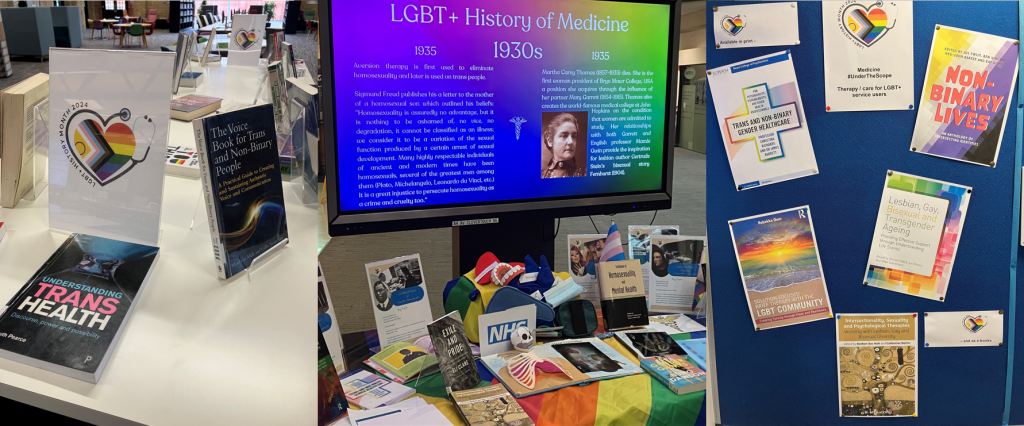February is LGBT+ History Month. This year’s theme is Medicine #UnderTheScope. Each of our libraries has a display this month of books and/or book covers relating to health and medical care of LGBTQIA+ individuals and communities. As we teach different subjects at each site, each display is different. At the Salomons Centre, the books focus on psychological care. Augustine House has titles relating to public health and social work. And Medway has some books for speech and language therapists on voice care for transgender and non-binary service users. Many of these books are quite recent, published in recognition of the need for medical, health and social care practitioners to understand the specific needs of the LGBTQIA+ community better.

However, despite these recent publications, there are many gaps in what they cover. A recent systematic review suggested that both staff and patients feel that healthcare professionals often lack the knowledge necessary to offer the care needed by their LGBTQIA+ service users (McNeill, McAteer and Jepson, 2023). Further training and readily-available information is very much needed . This blog will outline some of the ways in which further information about LGBTQIA+ healthcare can be discovered.
For a time, a free database called Knowsy allowed for searching of key health and medical evidence relating to the community. Powered by McGill University in Canada, this was an attempt to bring together disparate knowledge on the subject. Unfortunately, the website has been down for well over six months and there is no indication when it will be brought back. So what can we discover through the resources available here at CCCU?
Let’s get searching
Luckily, we have numerous health databases, which between them search the contents of many thousands of different journals covering a range of specialisms within medicine, health and social care. My personal favourite is CINAHL, a database for research relating to nursing and the allied health professions. But we also have general medical databases such as Embase and MEDLINE, as well as more specialist resources covering areas such as sports medicine, PTSD and maternity care. Our subject guides for nursing, medical sciences etc. list useful suggestions.
But access to the databases is one thing. Using them to identify relevant material is another. For example, we have a book in our collection, Lesbian, gay, bisexual and trans individuals living with dementia.
What if you wanted to find further research on this topic? Simply searching for this title is a non-starter – CINAHL finds a book review, while MEDLINE (depending on where you access it) either finds nothing or over-compensates by suggesting over 7,000 articles, many of them unrelated to dementia. I have no doubt that advances in AI will enable databases to interpret queries like this a lot better in future. We’re we’re not there yet, though, so what to do?
A good way to start is to simplify – we don’t need the word individuals in the search, so that can go. And the “and” in “Lesbian, gay, bisexual and trans” is causing invisible problems as well due to how databases interpret that word. Instead we can search for lesbian OR gay OR bisexual OR trans to indicate that we are interested in research which considers one or more of these groups.
OR is a signal for the database to find either of the words on each side of it – or in this case, any of the four suggested words. Using the advanced search to combine that with a search for living with dementia and both databases start to yield some interesting-looking results. Articles with titles such as:
- Are dementia services and support organisations meeting the needs of Lesbian, Gay, Bisexual and Transgender (LGBT) caregivers of LGBT people living with dementia?
- Understanding the experiences and needs of lesbian, gay, bisexual and trans Australians living with dementia, and their partners.
- How healthcare professionals can support older LGBTQ+ people living with dementia.

Words and letters
But our work is not done. We will be missing numerous relevant articles from this search due to the limited vocabulary we are using. Even from the titles of the articles we have found, we can glean words and acronyms to search with, including LGBT, transgender and LGBTQ+. If we add those in (OR is very accommodating of additional search words!), the numbers increase. Each addition may unlock further relevant papers. And then, of course there are other terms and other acronyms. For instance, our search does not include word such as queer, intersex, asexual or non-binary, among many others, so would miss entire sections of the LGBTQIA+ community).
Over time, the acronyms used for the community have shifted gradually and will have been used in contemporary research papers. And in other countries, the letters have been used in different orders, or different terms have been used. LGBT, GLBT, LGTB, LGBTQ, LGBTQIA, LGBTIQ, 2SLGBTQI (2S standing for two-spirit) and more, all of them with or without a +. And that’s without including the words for the different identities included within the community.
Incidentally, it’s not just on library databases where we need to consider the words we search with and to try alternatives. A quick experiment with Google found that a search for LGBT health finds very different results to a search for LGBTQIA+ health. There is some crossover, of course, but the first 10 results for each search only had three items which matched. And how many of us really look much further than that on our Google searches?
A truly comprehensive search of the literature may be impossible, as few researchers are likely to be aware of every term and every acronym used to refer to members of the LGBTQIA+ community in the literature. And even if they are, there are limits to how many terms can be included in a search.
Depending on how far back you want to go, it may also be necessary to include words which are no longer used, terms which have fallen out of favour due to being inaccurate or discriminatory. But if you want to find material written in the 1970s, for example, you will need to search using the words in use at the time. The same is true for other areas of research such as race and learning disability.
Casting the net more widely
Through the library services at CCCU, we have access to a wide range of databases covering different subject areas, or covering the same subject area from different perspectives. For searches relating to health and medical care for members of the LGBTQIA+ community, I might look at a combination of:
- CINAHL, which covers nursing and allied health care.
- MEDLINE and/or Embase for medicine.
- ASSIA, which searches journals relating to health, medicine and social care from a social science perspective.
- PsycInfo for mental health, psychiatry and clinical psychology.
- Social Policy and Practice, which covers pretty much what it sounds like it does, specifically within the UK.
There are plenty of super-specialised databases as well. Searching two or more databases can help reduce the impact of any biases which one might have. This is particularly important when you are researching topics such as gender, sexuality or race.
Finding good quality research relating to marginalised communities is often difficult. And LGBTQIA+ health is considered an under-researched area compared to the health of the population as a whole (see, for instance Coulter et al., 2014, which quantified this in the USA). In under-researched areas, it is often helpful to use what you find to help you find more information.
As suggested earlier in the post, one method is to draw on the words used in what you have found to expand your search. You can also look through the reference lists of material you find to see if it points you towards new sources. This can be particularly valuable for finding literature which traditional databases might overlook, such as reports written by charities.
With selected sources (the most interesting/relevant ones, ideally) you can also use tools such as Google Scholar, Pubmed, Scopus or Web of Science to find publications which have your selected source in their reference list. Using “Cited By” links, you can often find some fascinating material which you might otherwise have missed. This technique does not always work, but can get very exciting when it does! Just don’t get lost down an online rabbit hole following references back and forth for hours!
Here’s an example from Scopus, showing an article which appears in the reference list of 34 subsequent publications:

Final thought
Digging into the research on any topic is always a little more involved than you expect it to be. Even more so when you look into an under-researched area like LGBTQIA+ health. But think about where you search and the words you search with, and be prepared to follow the breadcrumbs, and you should be able to unearth what you need. And of course, feel free to come to us in the library for further help.
References
Coulter, R.W.S., Kenst, K.S., Bowen, D.J. and Scout (2014) ‘Research funded by the National Institutes of Health on the health of lesbian, gay, bisexual, and transgender populations’, American Journal of Public Health, 104(2), e105-e112. doi: 10.2105/AJPH.2013.301501
McNeill, S.G., McAteer, J. and Jepson, R. (2023) ‘Interactions between health professionals and lesbian, gay and bisexual patients in healthcare settings: a systematic review’, Journal of Homosexuality, 70(2), pp.250-276. doi: 10.1080/00918369.2021.1945338
Banner/thumbnail image by Wokandapix on Pixabay: https://pixabay.com/photos/scrabble-pride-lgbtq-lgbtqia-2495947/. Free for use under the Pixabay Content License.
 Library
Library David Bedford
David Bedford 813
813


